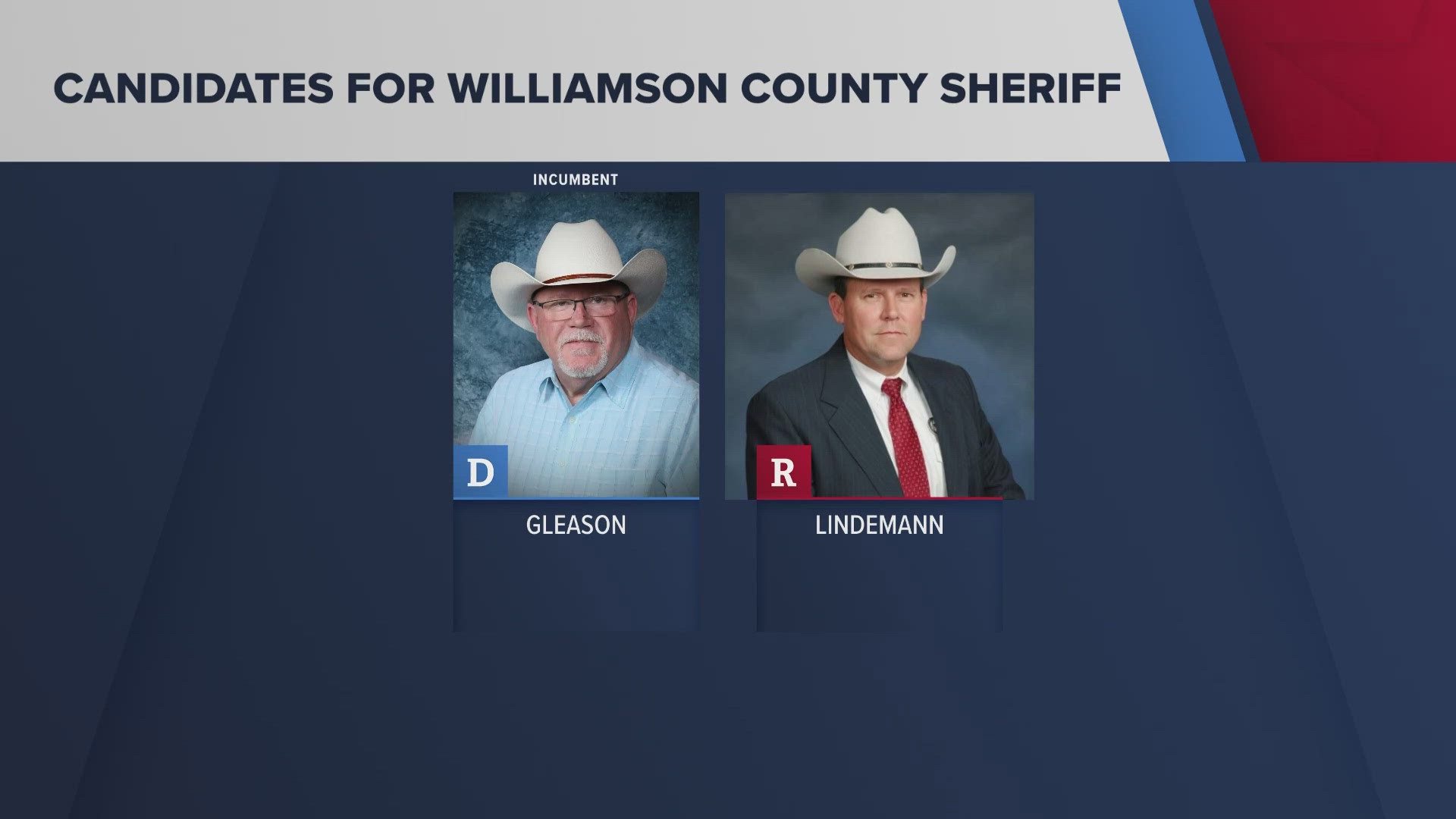WILLIAMSON COUNTY, Texas — The Williamson County sheriff candidates have an “R” and “D” under their names on the ballot, but when it comes to protecting their residents, both say party affiliations take a back seat.
“When you call 911, no one says, ‘911, what’s your emergency and what’s your party affiliation?’” current Williamson County Sheriff Mike Gleason said.
“We’re going to help them as much as they will allow us to help them,” Williamson County Precinct 3 Constable Matthew Lindemann said.
Gleason is up against Lindemann in Williamson County, and both candidates have a long list of qualifications from years working in Texas law enforcement.
Gleason’s background
Gleason is a long-time Austinite who started his decades-long career in law enforcement in Travis County. First, he was a jail correction officer, moving through the ranks, before eventually moving to Williamson County and being promoted to Assistant Chief Deputy.
After he retired, Gleason was called back to run for sheriff two years into former Williamson County Sheriff Robert Chody’s reign.
“My phone started ringing off the wall. ‘Will you please run for sheriff? This place is a train wreck,’” Gleason said.
At the time, Chody was the major Republican candidate, so Gleason said he didn’t stand a chance going up against him. To get on the ticket, he ran as a Democrat, claiming victory in 2020.
“I have a huge Republican following, and I carry a huge Democrat following because they just want somebody to come in and do the job, and that's all we do,” Gleason said.
Lindemann’s background
Lindemann grew up in Williamson County and started his career there back in 1985, working as a jailer and deputy sheriff. He then became a state trooper assigned to Williamson County and served on the Texas Department of Public Safety's SWAT team.
“It’s personal to me. Williamson County is my home,” Lindemann said. “I grew up here, I raised our children here, our grandchildren are being raised here.”
His career then took him across the state, serving 21 years as a Texas Ranger across 14 counties in Central Texas. He retired in 2018 and has been serving as the Precinct 3 Constable in Williamson County for the last three years.
“Williamson County needs a sheriff that leads by example, that has experience that goes beyond working here in Williamson County,” Lindemann said.
Both candidates say something important to their campaign is being a transparent leader. Gleason said during his term in office, he’s been successful in rebuilding the trust he felt was lost during the last administration.
“I will talk to anybody, and I will defend anything I've ever done,” Gleason said. “We are extremely transparent.”
Lindemann said that’s also something he hopes to do if he is elected.
“We are going to be tough on crime. We’re going to have a sheriff’s office that’s transparent and professional and accountable to the people,” Lindemann said.
Views on addressing fentanyl
Something else both candidates agree on is taking a strong stance toward criminalizing fentanyl.
“That's personal because I lay awake at night worrying about young kids dying from fentanyl. So we need to be proactive in that regard,” Lindemann said.
“We are leading the front in that," Gleason said. “My office was responsible for getting the law passed for Tucker Roe.”
As of August 2024, Williamson County had already reported 17 fentanyl-related deaths for the year and 35 from last year.
But the county has been working harder to prosecute these deaths more seriously. Thanks to a new law passed in the session last year, House Bill 6, Texans who provide fentanyl that kills someone can now be charged with murder.
Williamson County has already issued eight murder warrants for fentanyl-related deaths.
Views on protecting the border
Another policy on the top of candidates’ minds this election is their approach to enforcing the controversial state law known as Senate Bill 4. Approved last year, it would allow state and local law enforcement to stop anyone suspected of crossing the border illegally.
The law has been tied up in legal battles and is currently still being debated in a federal appeals court. While that happens, there have been differing views about when to enforce the law.
“I will enforce the law,” Gleason said. “My opponent keeps shoving that down my throat because I say I won’t enforce it. The reason I won’t enforce it is because my district attorney and county attorney both have told me, along with the governor’s border prosecution unit, says Senate Bill 4 is not enforceable.”
“I’ve sworn to enforce all the laws,” Lindemann said. “Once that law is decided in the upper courts, if it is a law in Texas that we can enforce, you better believe we’re going to enforce it to the best of our ability.”
The bottom line
What both candidates are clear on is that voters should not be voting straight across party lines.
"Look beyond the party. Look at the qualification, look at each of our histories, our experiences, how well we’ve worked with other law enforcement agencies because I think that’s what’s really important,” Lindemann said.
“If you’re not educated about the person you’re voting for, then go educate yourself … If you don’t believe in what I believe in, do not vote for me,” Gleason said. “Vote the person, not the party."

